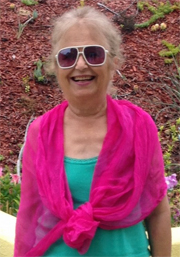Professor emerita continues research during retirement on West Coast
2020-08-14

When Professor Emerita Minou Bina retired in 2013, her love of science never wavered.
Now living in San Diego, Dr. Bina continues her own research projects in bioinformatics. “After the completion of sequencing of the human genome, funding agencies launched support for large scale projects known as ENCODE. Therefore, I no longer needed to have a wet lab because I could easily access and view the data of interest to my work by connecting to the genome browser at UCSC,” she explained.
Data availability facilitated developing experimentally testable hypotheses, in collaboration with Phillip Wyss, systems analyst/programmer in Chemistry’s Amy Instrumentation Facility, and X. Carol Song, senior research scientist in Information Technology at Purdue.
At the Purdue research repository, the team can upload data files of large-scale-analyses so that they can be accessed by researchers in the field. “I am increasingly inclined to believe that I have discovered a set of DNA codes that recruit DNA methyltransferase 3 to methylate specific CpG dinucleotides to engage the components of the imprinting machinery to genomic DNA,” she explained.
Recently, she has published an article reporting how the set of DNA codes could help with obtaining mechanistic clues on several human genetic disorders known as syndromes. Last year, with Phil Wyss, she reported how the set of the DNA codes could help with studies of genetic anomalies in the mouse. She says studies of various species are done to prove that these DNA codes are universal and apply to all mammals including cows (important to the economy) and dogs (important to studies of behavioral genetics.)
“Although I am enjoying to be able to pursue complex research problems, I greatly miss the academic environment. I miss chatting with my colleagues and the fabulous staff members that are the key components in the efficient machine that run our department,” she said, reflecting on a 34-year career at Purdue.
But her retirement lifestyle in Southern California is not all scientific research. She and her husband enjoy visiting beaches and the fun of year-round gardening. “I’m also polishing my French language and I’ve joined two groups - one for conversing in French, the other to read and discuss classical and contemporary French novels," she added.